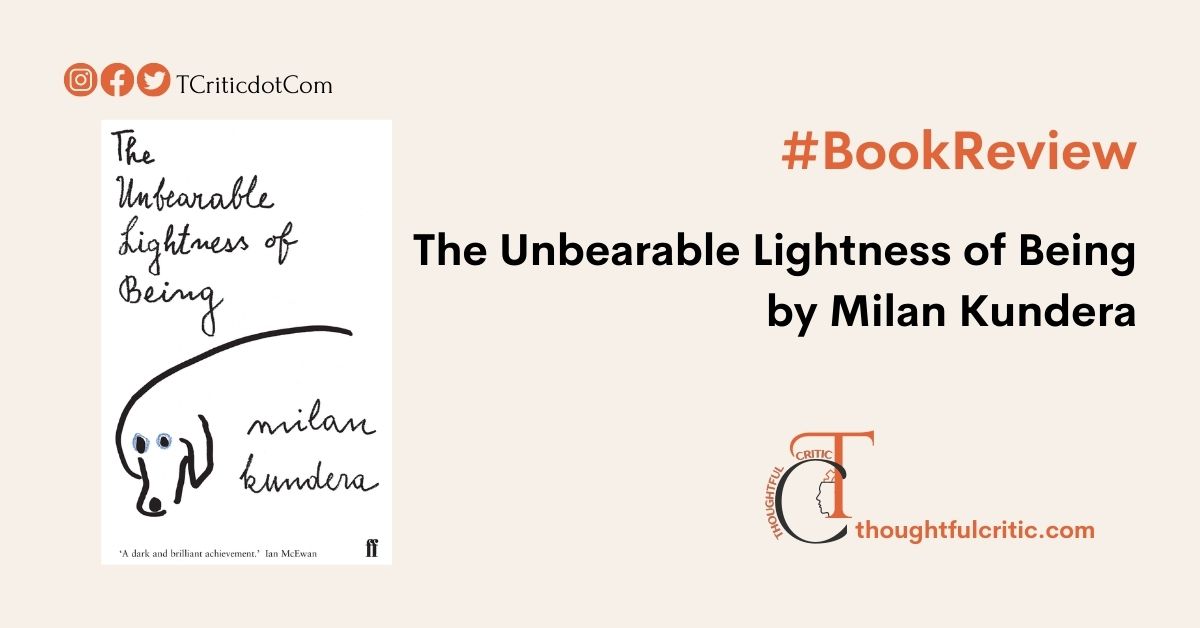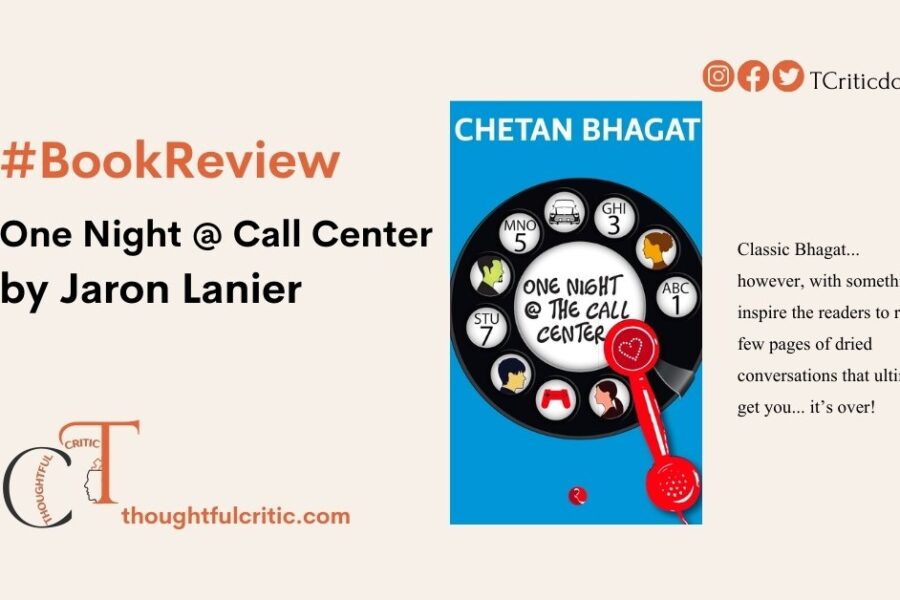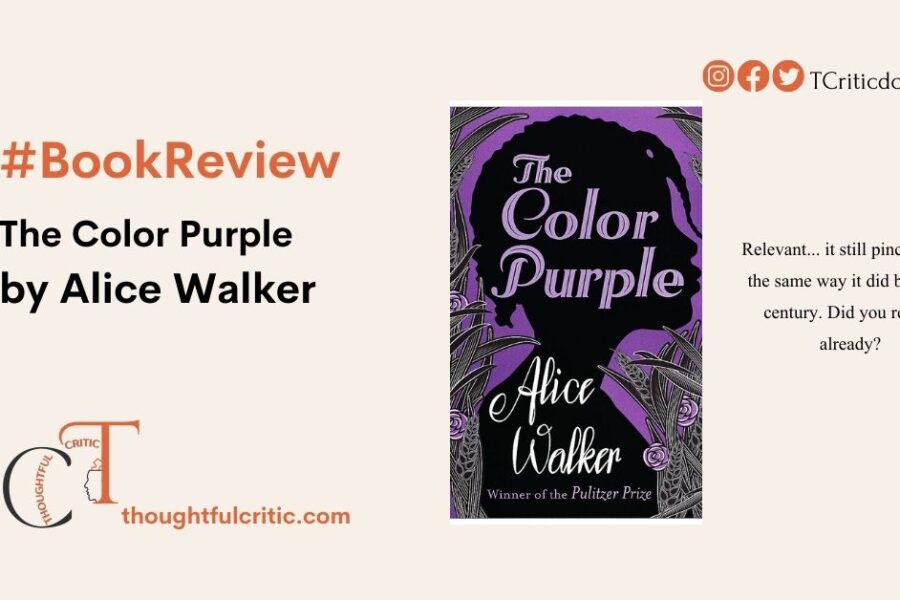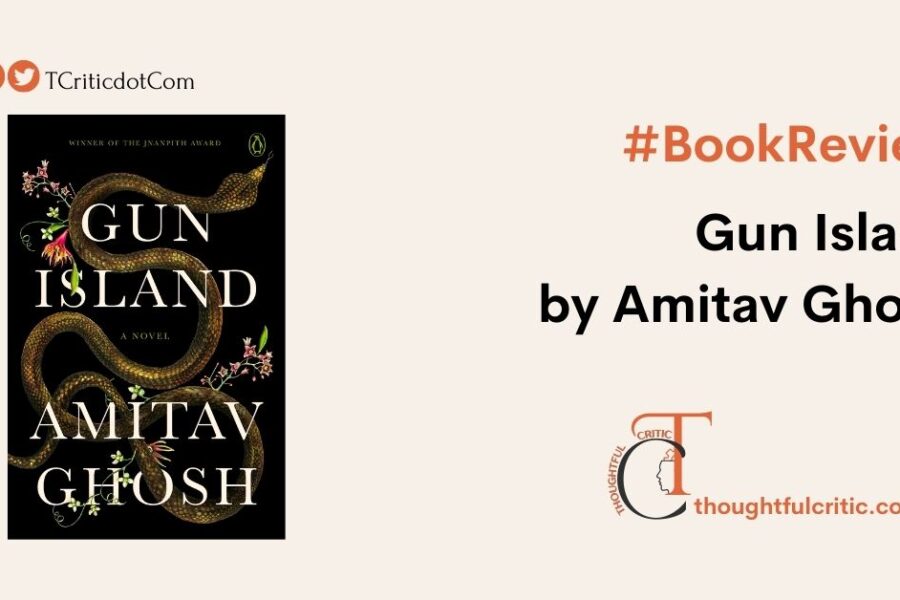Though it is in the interest of big publishing houses and literary circles to knight novels with phrases like immortal, timeless, eternal, classic, masterpiece, evergreen and whatnot, at times, these adjectives may ring the right bells in the hearts of the readers. Some novels are indeed timeless and evergreen. Some novels are certainly masterpieces. And, one such is The Unbearable Lightness of Being, a novel and a masterpiece by Milan Kundera, the famous Czech-French novelist, and it continues to captivate readers with its profound insights into existentialism, love, and the human condition. First published in 1984, the novel has garnered both critical acclaim and a devoted fanbase over the years. Though I found Kundera’s eloquent prose truly exciting and mesmerising, I will be with readers who find it a little overdriven and also obscure. Being philosophical doesn’t make it better if someone tends to, and eventually slips into, the abyss of obscurity! Nevertheless, Kundera’s deep philosophical musings make this book a timeless and thought-provoking read, albeit for a certain section of readers who may revel in reading philosophical novels adorned with adequately supportive language. And mark it that Milan Kundera’s work was originally published in Czech under the title Nesnesitelná lehkost bytí. And therefore, if you find the English translations boring or protracted linguistically, you can blame it on the translator. In this book review, I will try to highlight the literary merits of the novel along with the shortcomings that might hinder the readers’ engagement with it. And let’s begin with the story itself. In the section below, Plot Summary, you can find a short summary of the novel’s story.
Plot Summary:
The Unbearable Lightness of Being begins with an exploration of the lives of four interconnected characters in Prague during the 1968 Prague Spring. Tomas, a womanizing surgeon, is married to Tereza, a conflicted and insecure woman. So, these two characters are interesting, not normal as we expect people around us to be, and perfect vessels for thoughtful musings by the author. Tomas’ affair with Sabina, a free-spirited artist, adds further complexity to their relationship (Tomas and Tereza’s). Meanwhile, Sabina is no lesser than Tomas! She also has an affair with Franz, a kind-hearted scholar. As the political situation escalates, the characters’ lives intertwine with love, passion, and philosophical reflections. The story develops along with the developing and turbulent political climate. The characters in the novel face the eternal struggle between lightness and weight, ultimately leading to poignant decisions that shape their destinies. The novel concludes with a powerful and ambiguous ending that leaves readers contemplating the weight of choices and the essence of existence. Friends, the ending doesn’t lead you anywhere and you may remain with the weight itself! 😉
The Language of Thoughts:
Though all languages are languages of thoughts, I hope I am making myself clear while using the heading in the context of this Milan Kundera’s novel – The Unbearable Lightness of Being. As you begin reading the novel, you meet with countless instances of metaphors and embellishments that decorate the pages of this work. While I might be critical of the translators of various editions, most part of the translated version I read is a good job… The original text must have been capable of imprisoning the thoughts of the characters in a way that may have transported readers into a world of conjectures, illusionary linguistic sky-scrappers and much more. I will share a few examples of my assessment and I hope readers of Thoughtful Critic book reviews will find the same helpful (as they give a glimpse of the author’s imagination and his ability to translate the same into visible linguistic exhibition).
“Tomas did not realize at the time that metaphors are dangerous. Metaphors are not to be trifled with. A single metaphor can give birth to love.”
What did you see? The author is right! Metaphors are dangerous!
And likewise, the entire novel is full of such instinctive anecdotes. Readers will have a hard time getting across a few of them because of the intensity. However, reading page after page will not feel boring if a reader has previous experience in reading works that involve intense use of language to assert the thoughts (from behind the backs of the characters and situations). Milan has excelled at it – language!
However, reading this novel and fully enjoying the striking use of language might be challenging for readers on many occasions. Though I am reinforcing my thought, just shared in the paragraph above, let me give another example that is beautiful and demanding at the same time. The novelist has created an amalgamation of language, music, philosophy and popular culture at the same time. Here it goes:
“Our day-to-day life is bombarded with fortuities or, to be more precise, with the accidental meetings of people and events we call coincidences. “Co-incidence” means that two events unexpectedly happen at the same time, they meet: Tomas appears in the hotel restaurant at the same time the radio is playing Beethoven. We do not even notice the great majority of such coincidences.”
Philosophy embedded throughout:
Though the section just above may have been about the beautiful use of language by the author, it should also hint to readers about the philosophical nature of the narrative. And it goes right until the end. As you go on reading, you will realise that the novel’s narrative is interwoven with philosophical reflections, giving readers glimpses into the characters’ inner struggles and their understanding of existence. Though philosophy is not bereaved of the political angle, it seldom influences the core ideas of perennial philosophy! And yet, one can note after reading the novel that Kundera’s masterful storytelling draws vivid imagery of Prague’s political turmoil and the characters’ emotional landscapes, making the book an immersive experience.
Opinions on the Novel – Themes & Motifs:
As you may already have expected by reading the sections above, critics have praised Kundera’s ability to intertwine philosophy seamlessly into a compelling story. Robert Zaretsky, professor, scholar and former book critic at Los Angeles Review of Books, notes, “Kundera’s philosophical depth and literary skills are evident throughout the novel, creating an engaging experience for readers seeking both intellect and emotion.”
The exploration of existential themes has been a highlight of the novel, as it delves into the concept of “eternal return” and the burden of choice. Adding weight to this interpretation, renowned philosopher Martha Nussbaum hails the book as “a brilliant treatise on the tension between lightness and weight in human lives, inviting readers to ponder the deeper meaning of their existence.”
Though these experts and philosophers look at the book with the weight of all knowledge and expertise they earned hitherto, a common reader looks into a book only with the intention of finding out something ‘worth investing the time’ and entertaining. With this limited perspective, I am sure readers might be disappointed because the book may not allow disinterested ventures beyond the first chapter. The book is burdened with aged philosophy and critical existential dilemmas that may entice only those who have some knowledge about these concepts. Also, readers who have read or studied authors like Samuel Beckett and Raja Rao might find this novel interesting and compelling. And readers who revel in the works of novelists like John Green and Jennifer Niven or even the straightforward works by Amitav Ghosh or Margaret Atwood may find this book boring beyond the first few pages. This book, as I suggested somewhere above in this book review, demands intellectual and emotional investment. Moreover, while you are investing your thoughts and intellect, emotions and feelings, the author demands awareness and philosophical camaraderie… are you ready to go to this extent just for reading a novel? If yes, Milan Kundera promises a lot in return! If not, pass and move ahead!
And, at last, I am adding this useful section – Pros and Cons – where I will put everything about the novel in brief.
Pros:
1. Thought-Provoking Themes: “The Unbearable Lightness of Being” offers a profound exploration of existentialism, leaving readers pondering the philosophical questions raised long after they’ve finished the book.
2. Layered Character Development: Kundera crafts characters with intricate emotional depth, making their struggles and desires feel authentic and relatable.
3. Elegant Prose: The author’s poetic and eloquent writing style adds beauty and depth to the novel’s philosophical undertones.
4. Historical Context: Set during the Prague Spring, the book offers insight into the political and cultural climate of the time, enriching the reading experience.
Cons:
1. Challenging Philosophical Concepts: Some readers may find the heavy philosophical content a bit overwhelming, especially if they prefer a more straightforward narrative.
2. Ambiguous Ending: The novel’s conclusion leaves certain plot threads unresolved, which may leave some readers seeking more closure.
Conclusion:
The Unbearable Lightness of Being by Milan Kundera is a demanding novel, no doubt, but also a literary gem that has stood the test of time. With its blend of philosophical depth, intricate characters, and historical context, the novel continues to be a significant work in the world of literature. While its philosophical musings may not resonate with all readers, the book’s exploration of love and the human condition is both engaging and thought-provoking, making it a worthwhile read for those seeking a profound literary experience. Enjoy reading it if you can! You can get a copy of this work from Amazon India by clicking the link below:
Buy the novel from Amazon – click here.
Review by Alok M for Thoughtful Critic
The Unbearable Lightness of Being by Milan Kundera – Book Review
-
ThoughtfulCritic's Rating
Summary
NOT FOR EVERYONE! It demands intellectual, emotional and philosophical investment. If you are ready, the novel becomes enjoyable and absorbing. If not, it is just another literary weight you better decide not to carry! All the best, and may you make the best choice…




